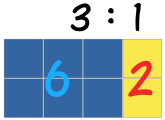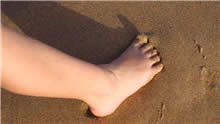A ratio says how much of one thing there is compared to another thing.

There are 3 blue squares to 1 yellow square
Ratios can be shown in different ways:
| Use the ":" to separate the values: | 3 : 1 | |
| Or we can use the word "to": | 3 to 1 | |
| Or write it like a fraction: | 31 |
A ratio can be scaled up:

Here the ratio is also 3 blue squares to 1 yellow square,
even though there are more squares.
Using Ratios
The trick with ratios is to always multiply or divide the numbers by the same value.
Recipes
"Part-to-Part" and "Part-to-Whole" Ratios
The examples so far have been "part-to-part" (comparing one part to another part).
But a ratio can also show a part compared to the whole lot.
Try It Yourself



What is the ratio of oranges to strawberries? : 
What is the ratio of strawberries to oranges? : 
What is the ratio of oranges to total fruit? : 
What is the ratio of strawberries to total fruit? : 
© 2015 MathsIsFun.com v0.91
Scaling
We can use ratios to scale drawings up or down (by multiplying or dividing).
The height to width ratio of the Indian Flag is 2:3
So for every 2 (inches, meters, whatever) of height
there should be 3 of width. |  |
If we made the flag 20 inches high, it should be 30 inches wide.
If we made the flag 40 cm high, it should be 60 cm wide (which is still in the ratio 2:3)
| |
We can make any reduction/enlargement we want that way.
Big Foot?
 | Allie measured her foot and it was 21cm long, and then she measured her Mother's foot, and it was 24cm long. |
"I must have big feet, my foot is nearly as long as my Mom's!"
But then she thought to measure heights, and found she is 133cm tall, and her Mom is 152cm tall.
In a table this is:
| Allie | Mom | |
| Length of Foot: | 21cm | 24cm |
| Height: | 133cm | 152cm |
The "foot-to-height" ratio in fraction style is:
| Allie: | 21133 | Mom: | 24152 |
So the ratio for Allie is 21 : 133
By dividing both values by 7 we get 21/7 : 133/7 = 3 : 19
It is still the same ratio, right? Because we divided both numbers by the same amount.
And the ratio for Mom is 24 : 152
By dividing both values by 8 we get 24/8 : 152/8 = 3 : 19
This time we divided by 8, but that ratio stays the same, too.
The simplified "foot-to-height" ratios are now:
| Allie: | 319 | Mom: | 319 |
"Oh!" she said, "the Ratios are the same".
"So my foot is only as big as it should be for my height, and is not really too big."




إرسال تعليق